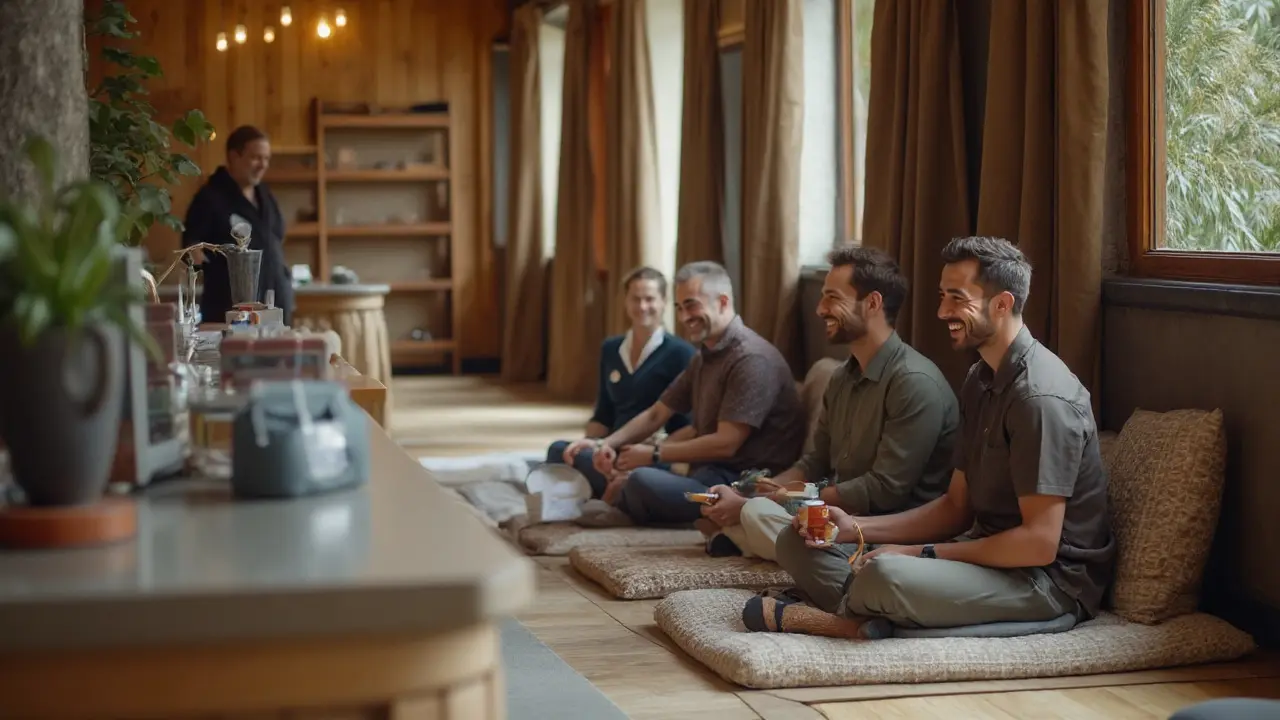You’re tight as a drum from desk duty, shoulders up near your ears, and London’s weather’s been kicking your mood like a cheap football. You want something real-no fluff, no spa elevator music pretending to fix your back. You want hands, knees, elbows, and centuries of technique rearranging your posture like it owes the city money. That’s Thai massage in London when it’s done right. I’m Dorian, I’ve had the rough and the refined across Bangkok, Chiang Mai, and right here in Zone 1, and I’ll tell you straight: London’s Thai scene, when you pick carefully, can be superb-clean, legit, and brutally effective.
Here’s what you’ll get: a fast TL;DR, plain-English steps for booking, real London 2025 prices, what actually happens on the mat, which oils and balms touch your skin, and how to spot the pros from the pretenders. Expect honesty and zero fantasy. This is bodywork, not make-believe. If you’re hunting for “extras,” you’re reading the wrong guide; good shops run a clean house and don’t mess about.
Short Version: What, Why, How (TL;DR) + The Tradition Behind the Technique
• TL;DR
- What it is: Traditional Thai massage (Nuad Thai) is floor-based bodywork-stretching, acupressure, joint mobilization, and rhythmic pressure. You’ll be moved, pressed, and lengthened like a yoga class where someone does the work for you.
- How to get it: Book online or by text with a reputable Thai clinic. Pick 60-90 minutes. Arrive clean, communicate pain points, and stay clothed (loose shorts/tee) unless you choose Thai oil massage.
- 2025 London prices: £55-£85 for 60 minutes in outer zones; £70-£110 in Central. 90 minutes runs £85-£140. Cash discounts still pop up; most places take contactless.
- Why it’s popular: Fast results for desk backs, runners’ hips, and jet-lag zombies. You stand up taller and feel lighter. It’s ancient craft, no fluff.
- Emulsion/oils: Traditional Thai uses minimal oil. Thai oil massage uses light coconut or grapeseed; balms like Namman Muay (warming) or a menthol rub may be used on tight spots. Unscented options exist-ask.
Now the meat. Traditional Thai massage isn’t random pressing. It’s a patterned system that’s been passed hand-to-hand for centuries. UNESCO inscribed Nuad Thai on the Intangible Cultural Heritage list in 2019-real recognition for a serious craft. The choreography looks calm to outsiders but it’s tactical: thumbs and palms map your lines, hips get anchored, and your limbs are leveraged into long arcs that unwrap tension. Think of it as manual mobility training with pressure points.
Why do Londoners love it in 2025? Because city life is a slow chokehold. You commute, sit crooked, slam coffee, and stare at screens-Thai therapists undo that lifestyle. I’ve stepped in with hamstrings like guitar strings and walked out with spring in my step, like someone oiled the hinges. Swimmers use it for shoulders, desk warriors for necks, lifters for hips. It’s not mystical; it’s mechanics done by someone who knows bodies.
Is it “better” than other massage styles? Depends on the job. If you want deep lengthening and joint mobility, Thai leads. If you want classic glide and chill, Swedish is your lane. If you need targeted knot-crushing, deep tissue or sports therapy fights for that crown. But for “I feel stuck in my body” days, Thai’s the cheat code.
Evidence? You’re not wrong to ask. Trials published in Journal of Bodywork and Movement Therapies (2015) and BMC Complementary Medicine and Therapies (2020) show Thai massage improving range of motion, reducing back pain, and easing stress markers. It’s not marketing talk; the outcomes line up with what you feel after a good session-looser hips, calmer nerves, better sleep.

How to Book in London, What Happens, Prices, Oils, and Etiquette (No Awkwardness)
First, you don’t need to overthink it. London has hundreds of Thai shops and clinics, from squeaky-clean studios near big stations to family-owned spots tucked off the high street. But because the city also has some chancers, you want a simple vetting process.
Step-by-step: Booking like a pro
- Pick your goal: Mobility reset (choose Traditional Thai), loosening plus glide (Thai oil), foot-and-calf reboot (Thai foot), or targeted back/shoulders (Thai + deep tissue combo).
- Search smart: Look for phrases like “traditional Thai,” “floor mat,” “acupressure and stretches.” Scan reviews for mentions of clean rooms, clear pricing, and consistent therapists’ names.
- Call or message: Ask two things-availability and therapist specialties (e.g., lower back, runners’ hips). A pro shop answers plainly, not pushy.
- Choose 60 vs 90 minutes: 60 works for maintenance; 90 lets them do the full tour-feet, legs, hips, back, shoulders, neck, and chest opening. If you’re a statue from work or lifting, go 90.
- Clothing: For traditional Thai, wear or borrow loose shorts and a tee. For Thai oil, they’ll drape you and use oil-undress to underwear or disposables. Keep it professional.
- Payment: In 2025 most places take contactless. Central clinics might add card fees; some still knock a fiver off for cash. Tips are appreciated (10-15% when it’s brilliant).
Real London 2025 price ranges
- Traditional Thai 60 min: £55-£85 outside Central; £70-£110 in Central.
- Traditional Thai 90 min: £85-£130 outside Central; £100-£140 in Central.
- Thai Oil 60 min: typically +£5-£10 over traditional.
- Foot massage 30-45 min: £30-£50 depending on area.
- Combo (Thai + Deep Tissue) 90 min: £95-£150 depending on therapist expertise.
Peak times (evenings and weekends) book up fast. Lunch slots and late mornings are easier. Many shops open 10:00-21:00, some till 22:00. If a shop is weirdly aggressive on the phone or vague about the service, give it a miss.
What actually happens in the room
- Intake: You point to the pain. “Right trap, left hip, hamstrings tight.” Rate your pain 1-10. Mention any injuries, blood-thinner meds, or recent surgeries.
- Traditional Thai flow: You’re on a firm mat. The therapist uses palms, thumbs, forearms, knees, sometimes feet-press-release patterns along legs, hips, back. Expect hip openers and spinal twists if you’re up for it. The rhythm is steady, almost meditative.
- Thai oil variation: Same mapping, more glide. Oil loosens the transitions and lets them sink deeper without skin drag. Drape stays on; they uncover only the area they’re working.
- Communication: Say “softer” or “more” without shame. It’s a conversation, not a test of toughness. Breathe through strong pressure; don’t hold your breath like you’re underwater.
- Aftercare: You’ll likely be offered water or tea. Expect a light floaty feeling and longer stride. Mild soreness is normal for 24-48 hours. Gentle walking and a warm shower help.
What emulsion or oils hit your skin?
- Traditional Thai: Minimal oil. Sometimes a dab of herbal balm on hotspots. Good for guys who don’t want that slick feeling.
- Thai oil massage: Light coconut or grapeseed is common. Scents? Lemongrass, jasmine, or lavender blends. Ask for unscented if you’re sensitive-or you’ve got meetings after and don’t want to smell like a spa.
- Herbal balms: Namman Muay (the Thai warming liniment used by fighters) or a menthol rub that feels cool-warm. Great on calves and lower back. Test patch if your skin’s fussy.
- Nut-free and vegan: Many shops stock grapeseed or sunflower for allergies. Say it upfront and they’ll swap without fuss.
Etiquette, so you don’t look new
- Arrive on time, phone off. Shoes off at the door is common.
- Be clear about boundaries and injuries. This is professional bodywork-no hints, no weirdness. Don’t be that guy.
- Hydrate after. Heavy lifting the same day? Keep it light; your tissues just got a reset.
- Tipping: If it changed your week, say it with 10-15% and a genuine thank you by name.
Safety and health notes
- Avoid Thai massage with acute injuries, fever, or recent major surgery. If you’ve got osteoporosis or blood clot risks, get medical advice first.
- For lower back disc issues, say it early-they’ll adjust stretches and avoid deep twists.
- Hypertension? Ask them to go easy on neck compressions; they have alternatives.
My quick take from the mat
I’ve had sessions where a 50-kilo therapist folded me like a deckchair and my hips popped like popcorn-in the best way. The trick is in the leverage and timing. When they brace your hip with a knee and sweep your quad with a palm, that’s decades of patterning, not brute force. A good London therapist keeps the rhythm, checks in, and leaves you taller. I’ve paid £120 in Central and £65 in Zone 3; the expensive one wasn’t “better,” just more polished. The best? The therapist who listened and hunted the exact lines that were strangling my hamstrings.

Scenarios, Comparisons, Checklists, FAQs, and Next Steps
Which type fits your situation?
- Desk-crunched, neck like a brick: Traditional Thai or Thai + neck focus, 60-90 min.
- Runner with tight hips/calves: Traditional Thai 90 with extra hip openers; add balm to calves.
- Heavy lifter with doms and knots: Combo Thai + deep tissue 90. Tell them exactly where you’re stuck.
- Anxious, sleep off, want glide: Thai oil 60-90 with light pressure-breath-paced.
- Jet lag, swollen feet: Thai foot 45 + short back/neck add-on.
Thai vs other styles (fast comparison)
- Thai: Stretch + acupressure + joint work. Clothes on (traditional). Great for mobility and posture reset.
- Swedish: Oil-based, long strokes. Best for relaxation, not intense change.
- Deep tissue: Targeted, slow, heavy pressure. Good for chronic knots, not much stretching.
- Sports massage: Goal-driven, often pre/post-event with specific muscle focus.
Best for / Not for
- Best for: Stiff backs, hip mobility, desk fatigue, runners/lifters needing length without losing strength.
- Not for: Acute injuries, fresh sprains, high-risk medical conditions without clearance.
Pre-session checklist
- Book 90 minutes if you’ve been jammed up for weeks.
- Wear or bring loose shorts and a tee (for traditional).
- State allergies and if you want unscented oil.
- Flag pain points and your pain limit. Say if you bruise easily.
- Eat light; heavy meals + twists = regret.
Post-session checklist
- Drink water. Gentle walk for 10-20 minutes.
- Warm shower, not an ice bath. Sleep will hit deeper-lean into it.
- Leave a quick note with your therapist’s name; when you rebook, ask for them again.
How often should you go?
- Maintenance: Every 2-4 weeks keeps desk damage under control.
- Acute phase (painful and tight): 1-2 sessions in 10 days, then move to monthly.
- Training cycles: Pre-competition, go lighter; off-season, use deeper work.
Common pitfalls to avoid
- Silence. If pressure feels wrong, say it. Toughing it out doesn’t make you a hero.
- Chasing bargains only. A £10 saving is pointless if the technique is sloppy.
- Going straight back to max deadlifts after. Give your body a day to settle.
- Assuming oil is standard. Traditional Thai is often dry; ask if you want glide.
Decision guide (rule-of-thumb)
- If you want mobility + posture: Traditional Thai.
- If you want relax + some depth: Thai oil.
- If you want knot busting: Thai + deep tissue combo.
- If feet/legs are the issue: Thai foot, then short back session.
Mini-FAQ
- What is it? A floor-based, clothes-on bodywork style using pressure, stretching, and joint mobilization.
- How do I get it in London? Book a Thai clinic with clear reviews and transparent pricing; choose 60-90 minutes.
- Why is it popular? Fast functional results-better range, less stiffness, calmer headspace.
- Why is it better? For mobility and posture work, the stretch-plus-press combo outperforms glide-only methods.
- What emulsion will I get? For traditional, little to none; for Thai oil, expect light coconut/grapeseed; for targeted spots, a warming or menthol balm. Unscented options are common.
- Does it hurt? It can feel intense-more “good pressure” than pain. You control the dial with feedback.
- Will I be sore after? Possibly 24-48 hours if you went deep. That’s normal. Gentle movement helps.
- Can I ask for a male or female therapist? Yes, most places let you request. Book ahead.
- Any legal/ethical lines? This is legit therapy. Sexual requests get you shown the door fast. Respect the craft.
- Mobile Thai massage? Some therapists do home visits, usually £20-£40 more to cover travel and time.
Real-world scenarios
- City week from hell: Book 90-minute traditional on Saturday morning. Ask for neck/hip focus. Walk after. Nap.
- Half-marathon build: 60-minute Thai with calves/hips openers every two weeks. Avoid heavy pressure the week of race.
- Strength block: Combo Thai + deep tissue bi-weekly; skip max days right after sessions.
Credibility markers (so you know it’s not hype)
- UNESCO recognized Nuad Thai in 2019 for cultural heritage.
- Randomized trials (Journal of Bodywork and Movement Therapies, 2015) show improved flexibility and pain reduction.
- Additional clinical studies (BMC Complementary Medicine and Therapies, 2020) note better range of motion and stress relief.
How it compares cost-wise in 2025 London
- Thai (Traditional): £70-£110 (Central) for 60 min. Great value for mobility work.
- Deep Tissue: £80-£130 depending on clinic credentials.
- Sports therapy: £90-£140, often with assessments.
- High-end spa Swedish: £100-£180 for the room and robe more than the fix.
My off-the-record tip
Ask for consistency. If you find a therapist who maps your body well, stick with them. They’ll remember how your left hip cheats and your right shoulder hikes under stress, and they’ll get to the fix quicker next session. That’s how you turn Thai work into maintenance, not emergency calls.
One more thing: don’t walk in expecting fireworks. Expect competence. The “wow” is when you tie your shoes without swearing, not a neon sign.
Booking script you can steal
- “Hi, I’m looking for a 90-minute traditional Thai this Saturday around 11. My left hip and right shoulder are tight. Who’s good with hips?”
- If Thai oil: “Can you do unscented grapeseed? I’ve got meetings after.”
- Payment: “Is there a card fee? Any cash discount?”
Red flags (walk away)
- Vague service descriptions, no mention of traditional techniques.
- Pushy upsells the moment you call.
- Dirty rooms, random pricing, or pressure to pay before you even see a room.
Next steps
- Pick your goal (relax vs reset vs repair) and choose the style accordingly.
- Book 90 minutes if you haven’t stretched since last Christmas.
- Tell the therapist your limit on pressure and the exact spots that nag you.
- Reassess in 48 hours; if relief lands, set a monthly slot.
Last bit, straight talk: London’s got the chops. I’ve had sessions in small upstairs rooms where a therapist reset my hips with two well-timed presses that beat any gadget in my gym bag. Don’t chase the fanciest reception. Chase skill. That’s the difference between a forgettable rub and a real reset. If you remember anything from this, remember this line to search: Thai massage London-then filter for transparency, reviews that mention specific techniques, and therapists people name. That’s how you land the good stuff without playing roulette.





